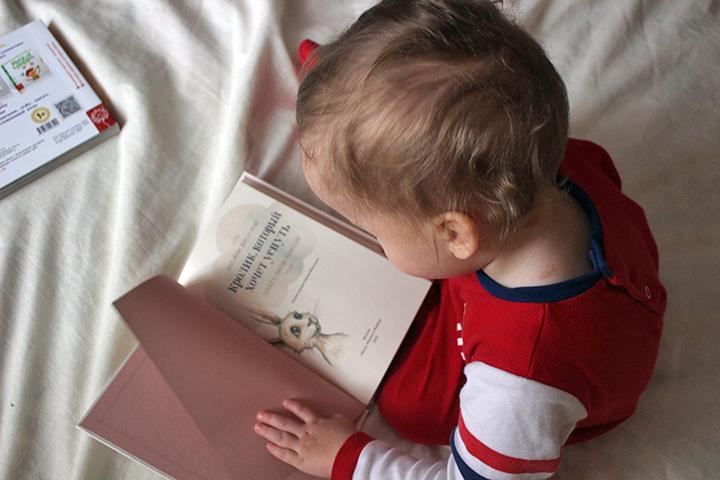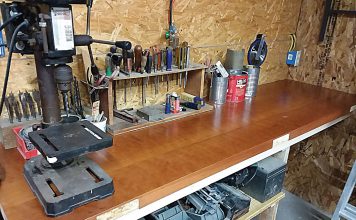 |
|
| Issue #142 • July/August, 2013 |
I write and edit for a living. I’m the senior editor for Backwoods Home Magazine for which I’ve written numerous columns during the last 24 years. Before that I did technical writing for defense contractors. Recently I published two novels, Danielle Kidnapped and The Devil You Know, and I’ll have two more completed before the end of the year, Fossil and Danielle Discovered. The trouble is, although I write, I can’t read.
Okay, that isn’t quite accurate. I can read some, but it’s not easy. I’m dyslexic.
If you’ve never heard the term before, the Merriam-Webster definition of dyslexia is:

A variable, often familial, learning disability involving difficulties in acquiring and processing language that is typically manifested by a lack of proficiency in reading, spelling, and writing. Melinda Beck, writing in The Wall Street Journal, cites a Yale University report that says dyslexia is a problem with “…associating letters with spoken sounds and blending them together fluidly to make words.”
They are both accurate. If you’re dyslexic, you were born that way and there’s no “cure” for this learning disability. You have to simply deal with it, as I’ve learned to deal with mine after a fairly lengthy struggle. If an adult had gotten a handle on my “disability” when I was a kid, my life would have been much easier. Too many kids, unable to read well and thinking they were stupid, gave up and fell through the cracks, even though many of them were otherwise very bright.
As many as one in five people have some degree of dyslexia, although only 12 percent of kids are diagnosed with it. Don’t let your own dyslexic kid fall by the wayside. This article is an attempt to help you homeschool your dyslexic child by showing you how I learned to cope with my dyslexia.
Dyslexia is not a type of retardation. When I was diagnosed, I thought it was. But a list of famous dyslexics reads like a Who’s Who of history and includes such notables as Albert Einstein, Thomas Edison, George Washington, Ludwig van Beethoven, Steven Spielberg, Leonardo da Vinci, and General George Patton. Dave Duffy, the publisher of this magazine, is also dyslexic.
My story
Until the ninth grade I was functionally illiterate. I was well-spoken but read fewer than 50 words per minute. I’d never read an entire novel, but could “fake” book reports. School was like a prison for me, one without parole. That’s when I was diagnosed as dyslexic. I’d never heard the word before not surprising, given my limited vocabulary at the time. I knew it had something to do with my brain and I was afraid it meant I had a form of retardation. The news made me sick. I kept it to myself for years.
However, it was also in the ninth grade that my reading began to improve. It wasn’t because of the school system, but because of a kid who was to become a lifelong friend, Fred Brennion.
Fred read voraciously. Most of it seemed to be either science fiction or stories about warfare, especially fighter pilots. He told me about the books he read and they sounded fascinating. I wanted to read them, too. And since Fred had joined the Science Fiction Book Club, I joined too. He perused book titles in the racks at various bookstores and markets, so I did.
But when I attempted to read the books I bought, it was like self-inflicted torture. I read paragraphs, then reread them because I didn’t know what they said. I’d often read them several times and I’d suddenly realize I’d somehow gotten the words out of order or, more often, I’d mistake one word for another and do it repeatedly. Once I understood the paragraph, I moved onto the next one, which I might get through unscathed, or I might stumble again and have to read and reread this one until it made sense. Finishing a page was an accomplishment, never mind finishing a whole book. Most of the books I started soon got put aside, and never finished, unless they were so compelling that I was willing to endure misery and frustration.
But there were a few I read from start to finish. One was a book on science and math by the Russian-born physicist, George Gamow, titled One, Two, Three…Infinity. It was fascinating because I was into science and I was learning stuff I was interested in. So I hung in. I started reading it in the ninth grade and finished it in the tenth. I think Fred read it in two or three days. Another took me an entire summer to read: Kon Tiki by Thor Heyerdahl. I stayed with it because it was an adventure that fascinated me.
Practice made … well, not perfect, but my reading did improve as I read more and I got so I could finish a standard-size novel in maybe two months, if it was so good that I stuck with it. But the improvement wasn’t much and I still read so poorly that, even today, I can’t watch movies with subtitles because I can’t read the subtitles fast enough. It’s either watch the movie and not know what anyone’s saying, or read the subtitles and not know what’s going on in the movie. (Even if I limited myself to just reading the subtitles, I usually can’t finish reading one before the next one flashes up on the screen.)
In the meantime, I was doing poorly in school. Between ninth grade and high school graduation, I flunked seven subjects and should have flunked eight, except that Mr. Cangiano, the ninth grade science teacher, promised an “A” to anyone who got a 95th percentile or better on the end-of-the-year standardized science test. I got a 99. At the time, no one could figure out how I got that score. Fred, by the way, got a 93, but he asked Mr. Cangiano if I was getting the “A.” I didn’t dare ask. Mr. Cangiano, who couldn’t figure out how I got such a high mark said he didn’t know. What he did was retest me and this time I got a 98, and then he gave me the A. The school system didn’t know what to do with me because they suspected I had a very high IQ, which I did, but I was at the bottom of the class, actually finishing dead last in grades.
Order from chaos
Today, it comes as no surprise to me that I did so well on that standardized science test. In the ninth grade I’d discovered the scientific method, the step-by-step method on which modern science rests, and to a 13-year-old boy who felt he was already failing at life, it was like an extraterrestrial had landed and was revealing the secrets of the universe. It opened up a new way of looking at the world and that was why I found Gamow’s book gripping and I hung in, reading it, for almost a year.
Getting good at science also saved my ego. I understood things many others did not. When I reached the 10th grade I could give a layman’s explanation of Einstein’s Theory of Relativity along with his theory of gravity, but I flunked 10th grade biology because I couldn’t read the textbook used in class.
If your kid has a logical mind, encourage it. This was one of my first discoveries about dealing with dyslexia: Things are easier to learn or memorize if I can see the logic behind them.
Vocabulary
There was yet another nightmare: Vocabulary. My vocabulary was very limited, and when I did encounter words I didn’t recognize or had forgotten the meaning of, “looking them up” was torture because that, too, involved reading and even if I found the definition, I often had to read it several times to understand it. Eventually, I gave up on the dictionary but not for long.
Enter, again, Fred. One day he said to me, “I can spell almost any word, even if I’ve never heard it before and I can probably guess its meaning.”
This sounded like a joke. I cautiously asked, “How?”
“I just look at the root and then the prefix and suffix, or both.”
I didn’t have a clue as to what he was talking about because I didn’t even know what those words meant. I was pretty sure that, if he wasn’t kidding me, this was going to be something I’d never catch on to. I asked him for an example, hoping I wasn’t about to become the butt of a joke.
He told me what the root of a word was. “In the word transport, the root, ‘port,’ means to carry. It’s in other words like ‘portable able to be carried,’ ‘teleportation carried over a distance,’ ‘import to carry in,’ ‘export to carry out’ …
“The ‘trans’ part is the prefix and means the other side or across or beyond. So, when I hear ‘transport’ I know it means something like ‘to carry across.’ Transcontinental means across the continent. Transgalactic describes light that travels across a galaxy.”
As if to show me more of this wizardry he said, “Prehistoric: the ‘historic’ part means history, the ‘pre’ means ‘before.’ So it’s ‘before written history’ and it’s pretty easy to get a handle on spelling it and guessing its meaning.”
“Or ‘archaeology.’ The root word is ‘archaeo,’ which means old stuff and lore while the suffix, ‘logy,’ means something like a theory or science. So, it’s the study or science of old stuff.” He explained the word “biology,” and related its suffix to more words like “geology,” “anthropology,” “cosmology…” He explained how the “phil” in “philosophy,” meant “love of” and associated it with words like “philatelist,” “philharmonic” and others.
I’m not saying the teachers hadn’t tried to impart this stuff to me, but long before I’d ever gotten out of the first grade, I’d pretty much given up on school and had stopped listening in class so every test was a surprise and every report card was a badge of shame. I was a failure at school. But here I was, standing on a street corner in Medford, Massachusetts, and a kid my age was enlightening me, opening up the world, the way no teacher ever had.
I nodded like I’d known it all along. But I was astounded and my head was swimming. Words actually made sense. There was order in how most of them were formed, where previously I had perceived only chaos. Order, rules of thumb, and patterns, this was where I shined. Beginning on that day, my vocabulary started to grow just because I looked at words differently. I even (grudgingly) began to use the dictionary again because I wanted to see how words I didn’t know were put together. Fred’s ten-minute lesson is probably the best way to start to expand any kid’s vocabulary, but it’s especially important to a dyslexic such as me because his explanation was dripping with logic, and logical things I could learn.
At this time I did not know Dave Duffy. He was in downtown Boston at Cathedral High School learning Latin from the nuns as part of the regular Catholic school curriculum. Like me, he was also struggling with reading, but Latin was the ancient language from which came many of the roots, prefixes, and suffixes that Fred was teaching me. Latin would be to Dave what Fred was to me.
Reading
So I was learning to read. My vocabulary was expanding. Still, I read slowly, and I was to discover not all writing styles are “equal.” Certain styles drove me crazy. I could read Hemingway, but not Faulkner. Later on, I could read Charles Bukowski’s or Richard Brautigan’s poetry, but not T.S. Elliot’s or Shakespeare’s. Turgid and complex writing styles are so much more difficult for dyslexics that I began to avoid them then, and I even avoid them now.
So, lean toward giving your dyslexic kid clearly written prose. Give him Hemingway, Twain, Robert Louis Stevenson, etc. Although their styles are clean and simple, their stories can be enjoyably complex and we dyslexics aren’t afraid of complex ideas.
If you must get complex prose, like Faulkner, David Foster Wallace, Thomas Pynchon (three writers I can’t read), get them audio books. Your local library should have plenty of them. There’s also text-to-speech software you can get for your computer. Even Kindle readers have text-to-speech enabled options for thousands of titles.
Writing
Even today, I don’t like reading instructions or manuals. Almost invariably they’re not written so a person who’s as poor a reader as I can readily understand them. So, if I have to assemble something I bought, or learn a new piece of software, and it’s not intuitive or there’s no one around to “show me,” I usually don’t do it. Dave’s the same way.
On the other hand, if either Dave or I have to write instructions for someone else, as we did when we were writing for the defense contractors, we write crystal-clear instructions because we write them so that even people who read as poorly as we do can easily read them. Though we both attribute our poor reading skills to dyslexia, we attribute our good writing skills to the same thing. We have a sizeable readership for our columns largely because we can take complex ideas and write them in such accessible prose that even a dyslexic can understand them.
Memory
I had already done lousy in grade school and was doing almost as bad when I got to college. I took seven and a half years, in and out of several colleges, before I got a degree in math. Learning was only a little easier because I read somewhat better. Not well, but better. (The last college, Suffolk University, threatened not to graduate me unless I took a remedial reading course. I refused because I already knew my problem with reading couldn’t be remedied. The threat proved hollow; they gave me my degree anyway.)
But I learned something in college that I hadn’t realized before: I could remember almost anything I heard. And if a class was interesting, as were the ones I took from one of my professors, Dr. Reiche, I was better off not to take notes, but to attend every class, and just listen to him lecture. I got nothing but “As” from him, even on the finals, for which I had not written notes from which to study. They were a breeze.
Notice how your kid learns and remembers. Does he remember what he hears better than what he sees? Or is it the other way around? Also, does he remember stuff that unfolds logically before him? To help him succeed, play to his strengths.
Spelling
I’m a pretty good speller, now. I’m no threat to any spelling bee champs, but I wouldn’t have struggled to be good at it except that I wanted to write. To get this way, I’ve forced myself to memorize but mostly I’ve associated words the way Fred taught me to, by understanding their roots, prefixes, and suffixes. But the funny thing is, I can’t spell many words off the top of my head. I can’t “picture” them properly. However, the same words I can’t spell off the top of my head I can spell if I’m writing them down. It’s a different kind of memory and lots of people are like me. I don’t know if they’re all dyslexics. So, don’t be surprised if your kid can’t spell a word if you ask him to spell it out loud, but he can if he’s writing it down. If so, make all of his spelling tests written.
Delegating
If he asks you the meaning of a word, or how to spell it, or the capital of Albania (Tirana), or how to boil an egg, don’t be too quick to say, “Look it up.” I once spent most of an afternoon looking up the word “bureau” to see how it was spelled. To a dyslexic, the spelling of that word, and many others, makes no sense. The frustration of looking up words almost made me never want to look up a word, a capital, or any other fact, again. The fact that I was constantly told to “look things up” myself made me stop asking for help.
Don’t be too quick to judge your student as lazy. “Looking it up” can be incredibly difficult for many dyslexics and “giving them the answer” will do something I don’t think most people have thought of: it teaches them something I never learned to “delegate,” and to be able to depend on others. In a New York Times article, Brent Bower writes, “It has long been known that dyslexics are drawn to running their own businesses, where they can get around their weaknesses … and play to their strengths.” Gabrielle Coppola, in Bloomberg Businessweek cites Julie Logan, a professor of entrepreneurship at Cass Business School in London: “Being a slow reader forces you to extract only vital information, so that you’re constantly getting right to the point. Dyslexics are also forced to trust and rely on others to get things done an essential skill for anyone working to build a business. People really struggle to delegate, and these people (dyslexics) have learned to do that already … If you’re bogged down in the details, you’re not out there looking at where your business needs to go.”
Dave Duffy was encouraged to depend on others. He had older brothers, Bill and Hugh, who he could depend on, who would give him answers and explanations. What they were doing, whether they realized it or not, was helping Dave learn how to delegate. On the other hand, my family thought they were doing me a favor by insisting, “Look it up yourself.”
Today, Dave feels confident in the people he hires. He has developed a “good built-in crap detector,” he says, and hires only good people, to whom he delegates important jobs and writing assignments, and the result is that he publishes a successful magazine. I never learned to delegate or how to depend on others, so I gravitated toward things where it was me against the world; I became a good chess player, a successful poker player, a nonfiction writer, and now a novelist. While Dave became a publisher who hires and directs others, including me, I became a one-man show.
So, here’s the homeschooling strategy for a dyslexic child:
Don’t discourage him. Answer his questions.
Help him learn how to depend on others and delegate.
Don’t try to turn him into a straight-A student. Chances are he’s never going to make the honor roll.
Encourage him to focus on what he’s good at — and what he enjoys. Writing, chess, math, and science saved my ego when I seemed to be failing at everything else. Mark my words, intelligent kids with learning disabilities need things they can be good at.
Play to your dyslexic kid’s strengths, whether you’re homeschooling him or if he’s in a public school. And, keep in mind, if he’s in a public school the teacher has 30 or more other students to attend to, so your “problem child” is likely to fall through the cracks unless you help him.















I am dyslexic and I successfully homeschooled five children, three of the five had a form of dyslexia, two had traditional dyslexia, one has dys-graphia (the inability to write in correct order – although she can write perfectly backwards!) My dyslexic daughter is now 22 and has published 5 novels. My dyslexic son is 20 and graduated from technical school at 19 with a 4.0 GPA and is now an electrician getting ready for his journeyman’s test! The dys-graphic daughter is 24, graduated (3.98 GPA) with a degree in business and is the office manager for a local chiropractor.
In addition to the things listed in your article, I would suggest the following to successfully home school learning exceptional children.
1) Don’t hold them back – accept that they have difficulties in some areas but they are probably very bright, don’t mistake differences in learning for lack of intelligence.
2) Read to them, make words accessible through hearing. Get audible books. If they can’t read their science and history books, read it together (I would have them read the subtitles, I would read the text.) A child that is kept back for a reading disability when they are perfectly capable of doing every other part of the curriculum on or above grade level is setting them up for failure and self esteem issues. Have them answer most questions orally in grade school. Transition to written answers in high school, to prepare them for college and the work place.
3) When they do read, have them cover what they have already read with a 3×5 index card. I don’t know why it works, but it does something in the brain that helps them to read more fluently.
4) Have them write their spelling words in sand (put a layer in a cake pan), something about using a finger in the sand helps, but don’t expect them to ever be really good at spelling.
5) Have them write on the computer, using spell check. But also encourage them to have EVERYTHING proofread by someone else, spell check can give false confidence. My favorite spell check mistake was “cloisterphobia” for claustrophobia, it still makes me chuckle.
6) Use textbooks only in high school for anything other than language arts and math. Textbooks, tests and worksheets for science and history were developed for classrooms where the teacher needed to tech many children and be able to give them a grade. Just you and your child can learn together and you know what they know without grading them.
7) Keep school to the basics and keep it short. You can learn almost anything in 20 minutes, so why give lessons that take 60 minutes or longer. Children can learn a full day of the 3 R’s in less than an hour, add an additional 1-2 hours for extras like hands-on history, science or art, this gives them the rest of the day to learn life. For example – My son was making knives, using his own home built forge, by the time he was 12. In high school, he did an average of 7 courses a year and was finished with all of them by 9:00 in the morning, finishing all 4 years in three and did his first year of college his senior year. He spent the rest of the day building things, making things, running his own yardwork business, and learning outside of school.
I am at the end of my homeschooling journey, my last daughter is graduating from high school this coming May, it has been quite an adventure and one I am glad we took together!